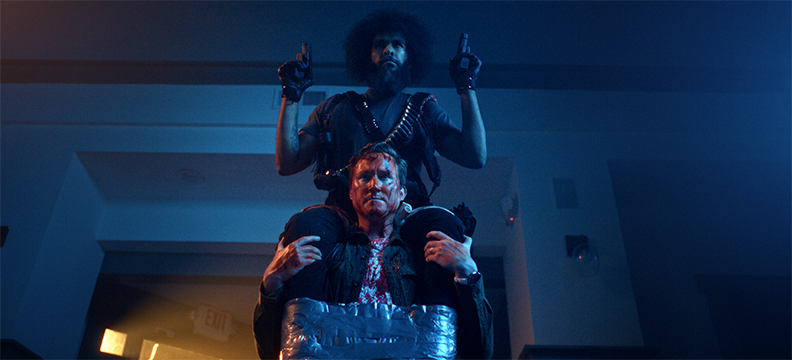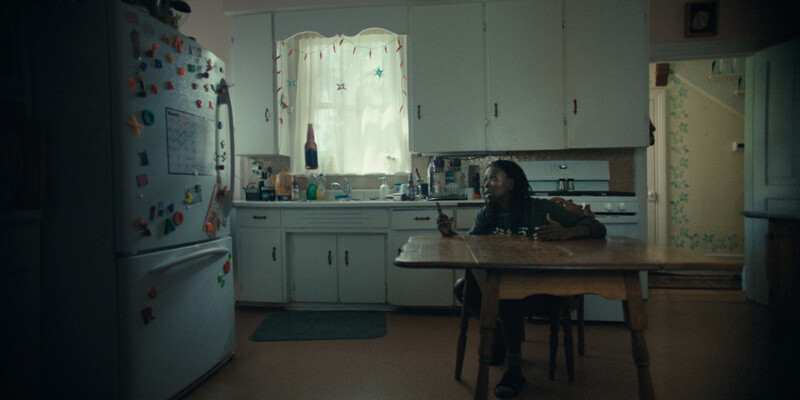
A Visual Poem of Tea, Distance, and Desire
MOVIE REVIEW
Black Tea (Blu-ray)
–
Genre: Drama, Romance
Year Released: 2024, Cohen Media Group Blu-ray 2025
Runtime: 1h 50m
Director(s): Abderrahmane Sissako
Writer(s): Abderrahmane Sissako, Kessen Tall
Cast: Nina Mélo, Chang Han, Wu Ke-Xi, Michael Chang, Pei-Jen Yu, Wei Huang, Isabelle Kabano, Emery Gahuranyi, Franck Pycardhy, Jacqueline Zhu Zhi-Ying, Véronique Bailly
Language: Mandarin, English, French, Portuguese with English subtitles
Where to Watch: available now here: www.kinolorber.com or www.amazon.com
RAVING REVIEW: When BLACK TEA opens with a woman walking away from her wedding, it suggests something is brewing. The choice to leave one life behind to forge another in an entirely unfamiliar culture is ripe with narrative possibility. Abderrahmane Sissako, best known for the politically potent film TIMBUKTU (a powerful experience), returns with a romance of a more delicate nature. While its premise holds promise, it’s the imagery—not the intimacy—that leaves the deepest impression.
Aya (Nina Mélo), a young woman from the Ivory Coast, relocates to Guangzhou, China, in what feels like both an act of defiance and self-preservation. There, in a tea shop nestled within a lively community, she slowly begins to find footing. The shop's owner, Cai (Chang Han), offers more than employment—he introduces her to the ceremonial world of tea, a quiet ritual that becomes the unlikely language through which their romance takes shape.
Sissako’s eye for visual storytelling is the film’s clearest strength. BLACK TEA is elegantly shot, bathing its characters in an almost hypnotic light, balancing movement and stillness with artistic care. Tea preparation becomes a cinematic event—the graceful motion of hands, the steam rising in quiet mist, the intentional pace of every step. These scenes are intimate not because of what’s said, but because of how they’re seen. The romance, unfortunately, doesn’t quite match that same clarity or intensity. It remains too internal, occasionally so restrained that it borders on inert.
The concept of brewing love through ritual has potential, but BLACK TEA sometimes confuses restraint for profoundness. The pacing is deliberate, even meditative, but it borders on slow to a fault. There are moments when we feel like we’re waiting for the story to catch up with the visuals. Themes of cultural exchange, unspoken trauma, and emotional healing flicker in and out, yet rarely take root in a way that resonates. The backstory of Aya's escape from her life in the Ivory Coast is more suggested than explored. While that ambiguity may be intentional, it lessens our connection to her arc.
And yet, it’s hard to deny the spell that the film occasionally casts. There’s something powerful in watching characters find shared purpose in a centuries-old tradition. Scenes of Aya learning the ceremonial gestures of tea are some of the film’s strongest, not because they advance the plot, but because they evoke something deeper about belonging, patience, and respect. This is where Sissako excels: when the silence speaks louder than exposition, when he trusts the frame to carry the meaning.
In that sense, BLACK TEA functions best as a sensory experience. It invites viewers to slow down, to sit with stillness, and to find beauty in quiet gestures. But as a romance, it feels underdeveloped, like a story still steeping that never quite finishes. You can see what it's reaching for—connection across cultures, love without urgency, healing without fanfare—but it doesn’t always deliver the emotional payoff that could elevate it beyond aesthetics.
The multilingual nature of the film—switching between Mandarin, French, English, and Portuguese—adds a layer to the narrative, showing how fragmented communication can still lead to meaningful connection. But it also mirrors the film’s challenge: juggling several threads without fully tying them together. The story asks us to appreciate the ceremony of love, but sometimes forgets to make us feel it.
Still, as an offering from Cohen Media and Kino Lorber’s always-interesting catalog—and a rare entry into cross-cultural romantic storytelling that doesn't pander or sensationalize—BLACK TEA is worth the time. Especially for viewers who value atmosphere and imagery over overt drama, the film offers a unique visual journey that lingers in memory, even if its emotional core remains elusive.
It’s a cup that’s expertly prepared and fragrantly presented, but not quite strong enough to leave a lasting impression.
Please visit https://linktr.ee/overlyhonestr for more reviews.
You can follow me on Letterboxd, Instagram, Twitter, and YouTube. My social media accounts can also be found on most platforms by searching for 'Overly Honest Reviews'.
I’m always happy to hear from my readers; please don't hesitate to say hello or send me any questions about movies.
[photo courtesy of COHEN MEDIA GROUP, KINO LORBER]
DISCLAIMER:
At Overly Honest Movie Reviews, we value honesty and transparency. Occasionally, we receive complimentary items for review, including DVDs, Blu-rays, CDs, Vinyl Records, Books, and more. We assure you that these arrangements do not influence our reviews, as we are committed to providing unbiased and sincere evaluations. We aim to help you make informed entertainment choices regardless of our relationship with distributors or producers.
Amazon Affiliate Links:
Additionally, this site contains Amazon affiliate links. If you purchase through these links, we may receive a commission. This affiliate arrangement does not affect our commitment to honest reviews and helps support our site. We appreciate your trust and support in navigating these links.



Average Rating